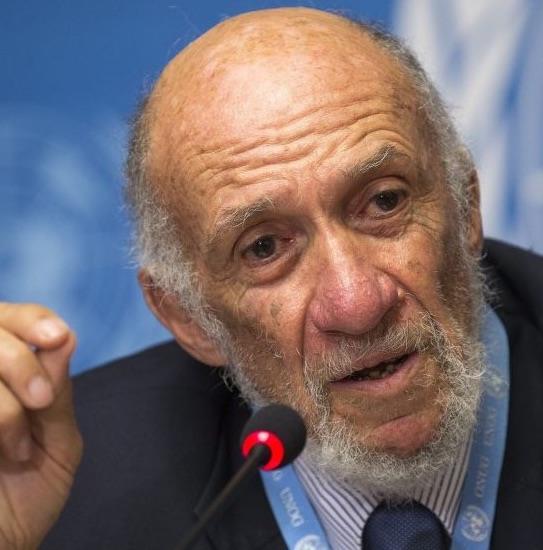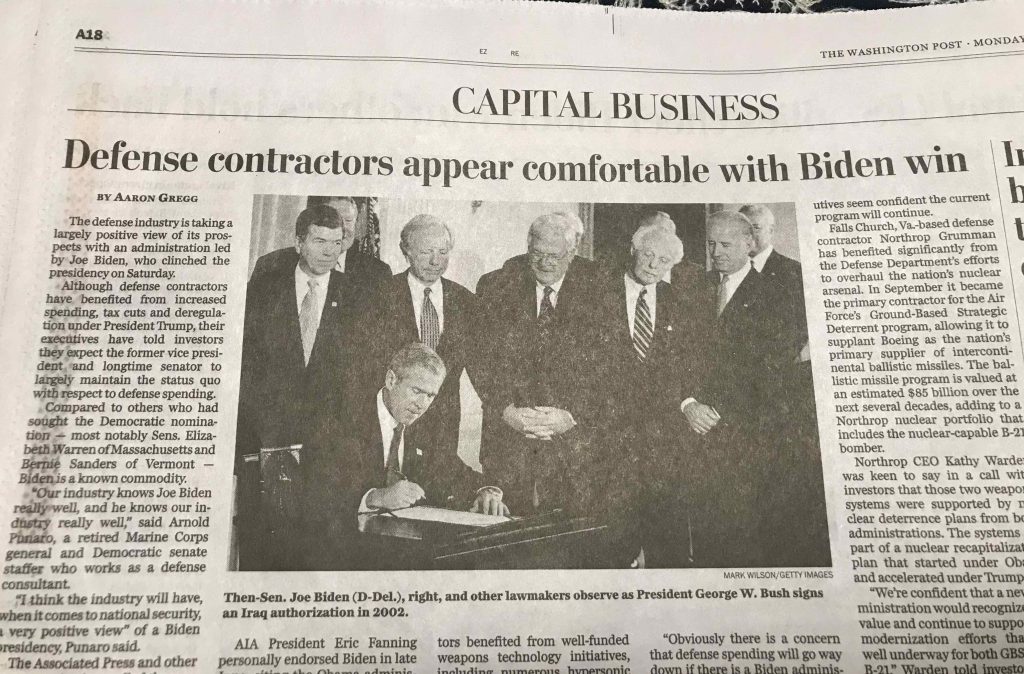Just World Ed’s President Helena Cobban and board member Richard Falk have been among those Americans taking a sober look at the implications of the recent election, in which it became clear by mid-morning Saturday (Nov. 7) that Joe Biden had won a narrow but irreversible victory over current President Donald Trump.
Both these veteran analysts of international affairs saw “good news and bad news” from the election results, but in ways that were interestingly different.

Cobban, a longtime writer and columnist on global affairs, was first off the mark with a quick blog post November 8 that summarized her main “takeaways” from the election.
The first of these expressed her consternation that,
Though Biden won, it’s still true that more than 70 million Americans cast a vote for Donald Trump. That, after four years of seeing him in action: racism, misogyny, crass cutting of health care and other vital social programs; “White” entitled-ism, anti-scientism, xenophobia, mean-spiritedness, bully-boy tirades, and all.
She noted that, “The degree of support that that ill-educated, anti-education, anti-science man won from Americans is a terrible ‘report card’ on the quality of the country’s education system” that warrants strong remedial action. But, she added, “Much more urgent is the need to deal with the disastrous medical and economic aspects of the Covid pandemic.”
Assessing that the public health situation Biden will face when he takes office will likely be catastrophic, she wrote that a broad nationwide lockdown “would almost certainly be necessary.” But she noted that with or without such a lockdown,
urgent and intensive steps need to be taken at the socio-economic level, to support vulnerable populations and small businesses, given that a return to anything like a pre-March-2020 ‘normal’ in terms of economic activity is not foreseeable for many more quarters to come.
When designing any such economic steps, she argued, “the mistakes of both 2008-09 and earlier this year need to be understood and avoided.” She urged, instead, a “Green” version of the approach Pres. Franklin D. Roosevelt used during the New Deal of the 1930s: one centered around large-scale direct government investment in projects that would both perform much needed upgrades of vital facilities and provide decent jobs, while largely sidelining the predatory financial institutions that profited so richly from the stimulus packages of 2008-09 and of earlier this year.
Regarding foreign policy, Cobban foresaw that “there will not be much oxygen in the U.S. political system to deal with foreign policy, for a while”. But she noted that Biden “is a classic, ‘U.S. must lead the world’ type of Democrat, as has been clear since (and before) the end of the Cold War. In 2002-03, he supported the invasion of Iraq.”
She concluded, however, that because of the United States’ declining power in world affairs, Pres.-elect Biden would be unable simply to “pick up where Obama left off.”
Indeed, she wrote,
rather than aspiring to ‘reassert American leadership’, the incoming leadership in Washington should much more appropriately seek to ‘restore respectful American membership’ in the community of nations and the various international organizations.

For his part, the distinguished international jurist Richard Falk largely concurred in this November 9 blog-post with Cobban’s view that the election results brought both good news and bad news. A reelection of Trump would have meant, he wrote,
a tighter embrace of an American version of fascism with constitutionalism, the rule of law, and human rights repudiated, and an autocratic/plutocratic style of leadership consolidated around an ideology of chauvinistic or nativist nationalism.
Regarding the Covid crisis, he wrote, the Biden victory,
means that the virus is likely to be brought under control as rapidly and humanely as possible, assuming that the inauguration of Biden occurs on January 20th. Beyond this, presuming some Congressional flexibility, a stimulus package beneficial to the poor and unemployed, as well as to small businesses is likely to be quickly forthcoming.
It would also, he wrote, “seem reasonable to expect improvements in health care, public education, judicial appointments, racial and gender equality from the Biden presidency.”
He noted that internationally, Biden’s victory, “will be greeted by world leaders around the world with a huge sigh of relief. It will have, additionally, some positive impacts on global problem-solving, giving rise overall to a more cooperative atmosphere.” And it might lead to,
a partial renewal of the global leadership role that the U.S. played in the decades after the end of World War II, although in a more muted manner, due to preoccupations with domestic challenges, and in a spirit more related to functional concerns, above all, climate change and health, than to ideologically adversary geopolitical relations.
Falk’s main concerns about the Biden victory lay, however, precisely in the international sphere. It is, he wrote,
also a victory for the American deep state, which has presided over the implementation of an evolving bipartisan consensus that has shaped American foreign policy ever since the wartime unity governments of 1941-1945. This foreign policy consensus can be identified with four overlapping dimensions:
(1) a global military security system consisting of hundreds of overseas military bases, all-oceans naval presences, operational intelligence capabilities in every strategically important country in the world, and a hegemonic control of nuclear weaponry;
(2) a string of formal and informal alliances and special relationships that connect U.S. diplomacy and geopolitical muscle with strategic priorities such as the defense of Europe, Taiwan, and Israel;

(3) a shifting continuing need to identify sufficient global security threats and interest to satisfy private sector arms sales interests and to ensure Congressional support for high defense budgets; the promotion of such goals tend to magnify security threats and induce geopolitical confrontations;
(4) a support structure for a market-driven world economy premised on ‘Neoliberal Globalization,’ premised on facilitating transnational capital investments and beneficial trading frameworks, and backed up by international economic institutions (World Bank, IMF, World Trade Organization), and supplemented as necessary by various hostile responses by the U.S. Government in reaction to displays of foreign economic nationalism, including reliance on sanctions, covert interventions, and coercive diplomacy.
He noted that, “the bureaucratic managers of the deep state, retirees from the CIA and Pentagon, were not comfortable with the Trump presidency because its leadership lacked a disciplined adherence to these four dimensions of the deep state consensus. ”
With Biden coming into power, he warned,
the deep state has a reliable veteran adherent of the deep state consensus, someone who can be trusted to follow its signals as to policy initiatives, especially in the domains of foreign economic and security policy. In the present setting, Biden has almost total freedom to opt for the center-right on foreign policy as the political mood is currently dominated by how he delivers on the home front.

